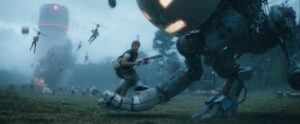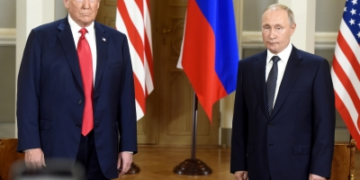Netflix’s ‘The Electric State’ transports the viewer to a parallel universe where the 1990s have been characterized by the robot-human war. In this universe, with the help of Walt Disney, robots had already been introduced into human homes as early as the 50s, and before long, they began taking over all the humans’ labor work. They had worked perfectly well for years, but suddenly, one day, they concluded that they were fed up with the exploitation of their kind and marched into the streets. Their movement went unheard, and finally, there was a war. The humans lost lots of lives at first, but then, a new technology emerged in the form of Neurocaster by the tech giant Ethan Skate, which turned the whole game around.

With Neurocaster, the humans had won the war in three weeks, the robots’ demise. Or so it appeared. A couple of years or so later, a teenager named Michelle finds out that her brother, Chris, who was to have perished in a car accident years before, is still alive. He is being detained somewhere, and although he cannot literally escape the location, his mind has been able to find a way out by hiding in a Kid Cosmo robot. The task of rescuing her brother and bringing him home energizes Michelle, and hence she is willing to battle against the most powerful individual on earth. But victory has a price, and Michelle must pay dearly to save the world. SPOILERS FOLLOW.
Why Does Michelle Disconnect Chris from the Machine?

Does He Live? In her search for Chris, Michelle learns that her brother is the cause of the victorious triumph of the all-encompassing Neurocaster. It is his brain that has been fueling the mainframe, causing the machine to operate in top condition. Yet, Chris and the machine have been symbiotic over the years, meaning that if unplugged from one another, none of them will live. This sets her up with an impossible choice. If she unplugs Chris, the Neurocaster will not work, Skate will be outed, and the world will be a better place. But if she doesn’t, she’ll never be able to rescue Chris, and he will remain in constant limbo where he’s not quite alive and not quite dead but just a means for Skate to use to keep the Neurocaster active.
Chris informs her that he is prepared to let go to alleviate Michelle’s dilemma. He cannot imagine having to spend one more day in this manner, and he knows that if something is not done immediately, he will have to live in this fashion for one hundred years. He has already lost enough time in this way to be able to stand to do so for an eternity. He reassures his sister that he has been the luck of having walked the world alongside her and viewed it in all its ugliness and beauty. This is yet another reason why he cannot be trapped in this body and needs to be given permission to die. Even though she cannot bear the idea of losing her brother all over again, Michelle must accept this as the best and only option. In any other case, all the death and sacrifice, particularly by the robots who bled and perished for her, would be for naught. Michelle therefore unplugs Chris from the device, and with the loss of his life support, he departs from the mortal world. Or so it appears. During the final scene of the movie, we see the Kid Cosmo robot cast into a wasteland. Initially, it lies motionless. But then, as a dog laps up water, we notice the reflection of the robot in it, indicating that life still remains in it. Given that the robot had contained Chris’ brain all this while, it is possible that an electric spark was left behind. Earlier in the movie, Chris explains to Michelle about two bodies touching each other and remaining joined together until the end of time because their electricity has intertwined with that of the other.

And then there is also the aspect that his brain was different from any human’s. The moment when he figures out something in minutes that Einstein took three days to comprehend reflects how extraordinary a brain he possesses. It is so potent that it energizes a machine sustaining all the Neurocasters. When half his consciousness gets away with the Kid Cosmo robot, the Neurocasters malfunction and need all of Chris to function at maximum capacity. Is it possible that when Chris was dying, he left a part of his consciousness in the robot so that it could operate while his body was permitted to die? Did they not design the Neurocaster to enable a person’s consciousness to exist in two places at once? Whereas other individuals could not survive without the machine, Chris’ mind was stronger than that and managed to find a way to sustain himself in the robot, hence he can now be with Michelle once and for all.
What happens to Herm? Does he die?
When Michelle sets out to search for Chris, she approaches the assistance of a smuggler named Keats and his robot, Herm. The duo leads him into the forbidden zone and subsequently accompanies her to fight at Sentre’s Seattle headquarters. As she infiltrates the building, they engage the battle outside and distract the villains long enough for her to execute her task. Things turn rather sour for them as numerous robots get killed in the battle. Herm also is subjected to intense fire, and his system eventually goes down. In his last words, he says to Keats that he is going to sleep, and that makes the human release his emotions and avow his love for the robot.
To lose Herm would be a positively heartbreaking thing, but then it is revealed that, like Chris, Herm too has a couple of tricks up his sleeve. He was the sort of robot who existed in plenty of sizes. When he comes into the fight, he is like a Russian doll. When his exterior body is destroyed, the interior body shows up and battles. When that is destroyed, another emerges crawling out and battling, and so forth. Though Keats was aware of it, he did not know where these bodies end. He believed that the body that Herm had with him was the last one. But at the end of the battle, he finds another shape within it, who is smaller in size but no less clever and affectionate.
Do the Robots Succeed? What becomes of Ethan Skate?
All that the robots ever desired was their right to live a noble life. Humans treated them like they were mere machines created to work for them. But as artificial intelligence grew, the more robots understood they were being used like slaves, and they did not like that. It was because humans would not grant them their rights that the war broke out, which robots would have won if not for Chris and his super-powered brain. The war made the robots villains, if they hadn’t already been portrayed so, and individuals like Ethan Skate heroes of humanity by assisting in the winning of the war.

At the end, though, Skate’s real face is revealed, and it is made apparent that he does not care about humans either. Had he cared, he would not have manipulated Chris in such a manner. He would also not have let other humans be murdered for his gain, but he did. It takes awhile for the world to catch on, but catch on they do. We witness this change of heart with the Butcher’s turnaround, where he does not murder Mr. Peanut during combat, and refers to Skate as worse than robots. When Michelle disengage Chris, all the Neurocasters go offline, leveling the playing field for the robots and providing them with the upper hand they were always missing. When Mr. Peanut forces Skate to come face-to-face with him, he does not kill the sole individual directly responsible for the deaths of a thousand of his own kind. He employs the newfound weakness of man as the means to have a fresh treaty signed between humans and robots where both are placed on the same footing and robots are granted the reprieve they so badly need and deserve. Following this is Michelle’s video, in which she exposes the truth regarding Skate and how he manipulated Chris. This becomes the reason why the law punishes Skate for his wrongdoings. He goes to jail, and the world is rid of Neurocaster. Michelle urges individuals to venture out and connect with one another because that is what makes them human. The robots, meanwhile, get an opportunity to live their life on their terms. Even as it is a long and tortuous road that lies ahead, particularly when it comes to establishing a permanent common place with the humans, hope has finally been given to them. Read More: The Arrested Development Easter Egg in The Electric State, Explained
























